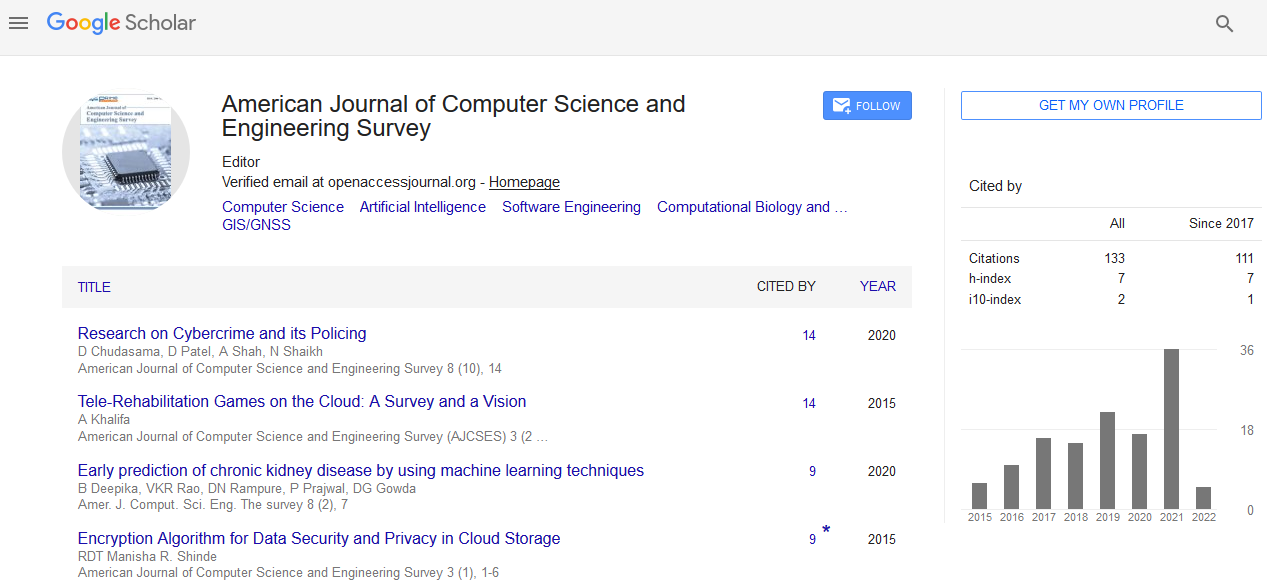Ahmed Nabih Zaki Rashed*
Department of Electronic and Electrical Communication, Engineering Department, Menoufiya University, Al Minufya, Egypt
- *Corresponding Author:
- Ahmed Nabih Zaki Rashed
Department of Electronic and Electrical Communication
Engineering Department
Menoufiya
University
Al Minufya
Egypt
E-mail: ahmed 313@yahoo.com
Received Date: May 06, 2021; Accepted Date: May 20, 2021; Published Date: May 27, 2021
Citation: Rashed ANZ (2021) Overview of Data Collection and Analysis. Am J Comput Sci Eng Surv Vol. 9 No. 3:e008.
Editorial Note
I am glad to present the Volume 9, Issue 3 of the journal on
behalf of the Board of American journal of computer science
and engineering survey and co-editors. American journal of
computer science and engineering survey is having International
Standard Serial Number (ISSN) of 2349-7238. American journal
of computer science and engineering survey is imedpub
publisher.
The Editorial Board is a group of scientific experts in the
journal's field. Editorial board members promote the journal to
their colleagues and peers. Assist the editors in decision making
over issues such as plagiarism claims and submissions where
reviewers can't agree on a decision.
The scope of Editorial Notes in Computer Science covers
Computer Science (miscellaneous), Theoretical Computer
Science, Bioinformatics, Cloud Computation, Computational
Sciences, Data Mining, Machine Learning, Mathematical
Modeling, Cryptography, Neural Network, Robotics Research,
etc.
American journal of computer science and engineering survey
functions on principles of scientific excellence, publication ethics
and transparency. It makes the authors easy to submit their
articles through the online manuscript submission and review
system managed by imedpub as the publisher. Journal follows
strict guidelines related to publication ethics and conflict of
interests.
Manuscripts are sent to the preliminary check soon after the
author submitted the article. Decision will be known within few
hours of its initial submission. Later editorial board members will
be assigned and reviewers will be assigned for the review
process.
Manuscripts are reviewed at the editor-in-chief, senior editor,
and associate editor levels before being sent out to reviewers. At
any of these stages an editor may reject the manuscript or send
it back to the author for improvement. Review comments
received from the reviewer will be sent to the author and timely
updates regarding the review process will be notified to the
author. In the case of immediate revision, authors are given a
chance to provide an enhanced manuscript to the eventual
reviewers, thus increasing the odds of acceptance. Associate editors complete a short evaluation for each reviewer on each
manuscript. This process reminds reviewers that they are
responsible for timely, high-quality reviews and also serves to
help identify future associate editor candidates.
All manuscripts including editorials are subjected to peer
review process. Members of the editorial board also prefer to
submit their articles at many instances. In fact, IPACSES
encourages editorial board members to actively contribute.
However, no special privileges are given to anyone.
This journal is indexed in the source information for data
aggregation may originate from public records and criminal
databases The data is then compiled into aggregate reports and
sold to corporations, as well as local, state, and federal
government entities. This data can be used for marketing
purposes as well. Many data brokers' actions in the United
States are governed by the Fair Credit Reporting Act (FCRA),
which governs consumer reporting organizations. Personal
information is then gathered and packaged into consumer
reports, which are sold to creditors, employers, insurers, and
other corporations.
Database aggregators provide a variety of information
reports. Individuals can obtain their own consumer reports,
which include basic biographical information including their
name, date of birth, current address, and phone number.
Employee background check reports, which include extremely
specific information such as previous residences and length of
residency, professional licenses and criminal history, are
available to eligible and approved third parties. This information
can be utilized for a variety of purposes, including background
checks for employees, insurance coverage, pricing, and law
enforcement. Database aggregators, according to privacy
advocates, may supply inaccurate data.
Consumers can use one master PIN on a single website to
access a variety of PIN-protected websites containing personal
information, allowing them to access a variety of PIN-protected
websites containing personal information. Financial
organizations, stockbrokers, airline and frequent flyer and other
reward programs and e-mail accounts are all examples of online
account providers. Using account users' PINs, data aggregators
can collect account or other information from designated
websites.

